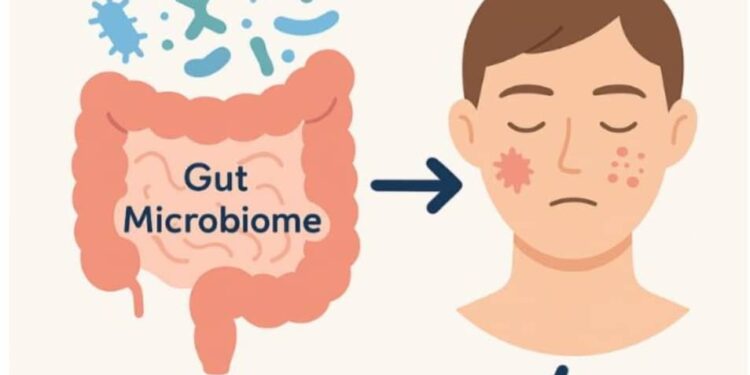It is common to receive lectures on how nutrition is important for glowing skin. What isn’t as common is learning about certain bacteria that can help activate properties for glowing skin. Not just ordinary bacteria, but “good bacteria”. According to scientists, probiotics, which are referred to as “good bacteria,” help to balance the gut microbiome, which in turn supports skin health in several ways.
How is this possible? Let’s dive into the connection between the gut and the skin and why probiotics matter.
The skin acts as a barrier against disease-causing microorganisms and harmful substances and is a vital defense against infections. Despite the skin’s function, various skin issues are often met with external treatments, leading people to frequently apply cosmetic products directly on their skin. Amazingly, these products could be more or less toxic to the user’s health.
Nonetheless, internal activities in the gut may contribute to the functioning of the skin, suggesting the need to evaluate available treatments before considering them. For example, a skin issue could be the result of a “leaky gut,” where inflammatory molecules and toxins enter the bloodstream without control.
The gut microbiome influences skin health through the production of fatty acids that are beneficial to the immune system in regulating inflammation. When the gut microbiome becomes unbalanced, skin issues like acne, eczema, or psoriasis can develop. One example to explain this is when you eat food that you are allergic to and then develop rashes. What simply happened is that the gut negatively reacted to the range of chemical compounds, resulting in autoimmune actions like the rashes.
It becomes essential to have the right balance in the gut to avoid skin-related issues. While it is often advised to avoid using several cosmetic products, probiotics stand out as an organic solution to complement the demands of the skin.
The skin generally benefits from probiotics by inhibiting the cleavage of collagen, reducing the production of melanin, and improving the skin barrier. All of these contribute to anti-aging, whitening, and anti-wrinkle effects, respectively. Furthermore, probiotics can help improve skin moisturization and ensure that you don’t look older than your age by simply inhibiting cell decay and prolonging the cell cycle.
Daily sources of probiotics include fermented foods like yogurt and sauerkraut, or probiotic supplements. However, the supplements may work faster to improve the internal microbiome. As a result, consistent consumption of probiotic-rich foods can support gut health and reduce the outbreak of skin conditions like acne and eczema. Similarly, probiotics can be applied topically through skincare products before moisturizing the skin, allowing their active ingredients to work effectively.
About the Author
Itunuoluwa Olatawura is a dynamic professional with a versatile background in administration, client support, and the wellness industry. With a foundation in Media and Communication Studies and over three years of experience in administrative support and virtual assistance, she has built a reputation for being resourceful, adaptable, and results-driven. Her career journey reflects a commitment to organisational growth, transparency, and fostering positive stakeholder engagement.
Beyond her professional career, Itunu is a CIDESCO-certified Aesthetician and founder of Candleluxe Essentials, a wellness brand dedicated to creating candles, diffusers, and aromatherapy products that elevate everyday living. She also manages a skincare consultation company, where she provides tailored skincare analysis and education, blending her passion for beauty and wellness with her communication skills to impact lives positively.
Passionate about efficiency, creativity, and service, Itunu thrives at the intersection of corporate structure and human-centred wellness. She envisions continuing to build a career that promotes accountability, well-being, and meaningful transformation both within organisations and in the communities she serves.
Contact Details
Instagram: @itunu_olat
Email: work.itunu@gmail.com


















































































 EduTimes Africa, a product of Education Times Africa, is a magazine publication that aims to lend its support to close the yawning gap in Africa's educational development.
EduTimes Africa, a product of Education Times Africa, is a magazine publication that aims to lend its support to close the yawning gap in Africa's educational development.